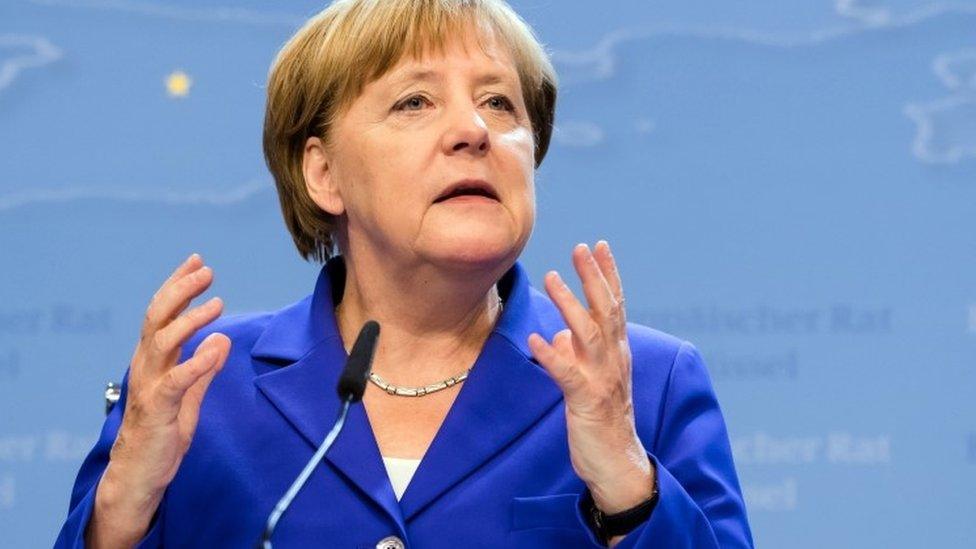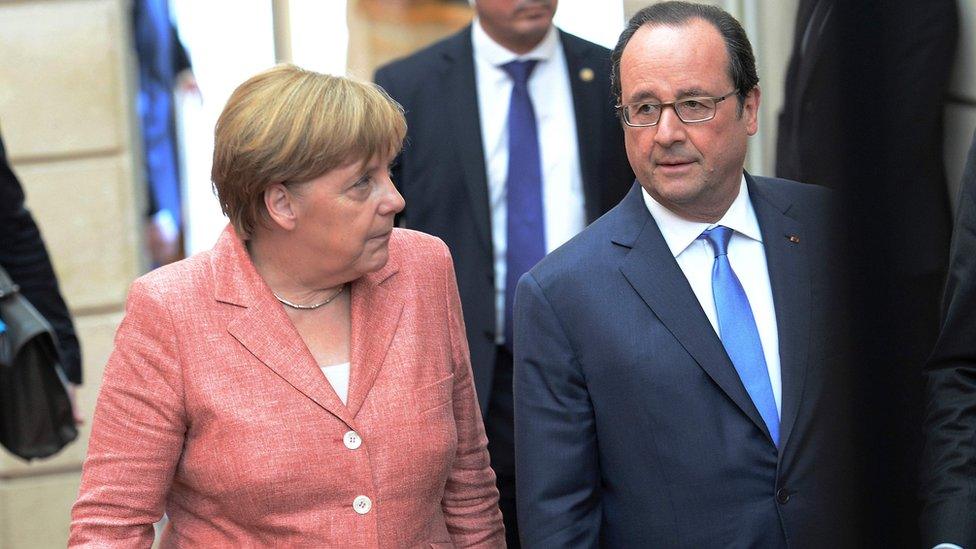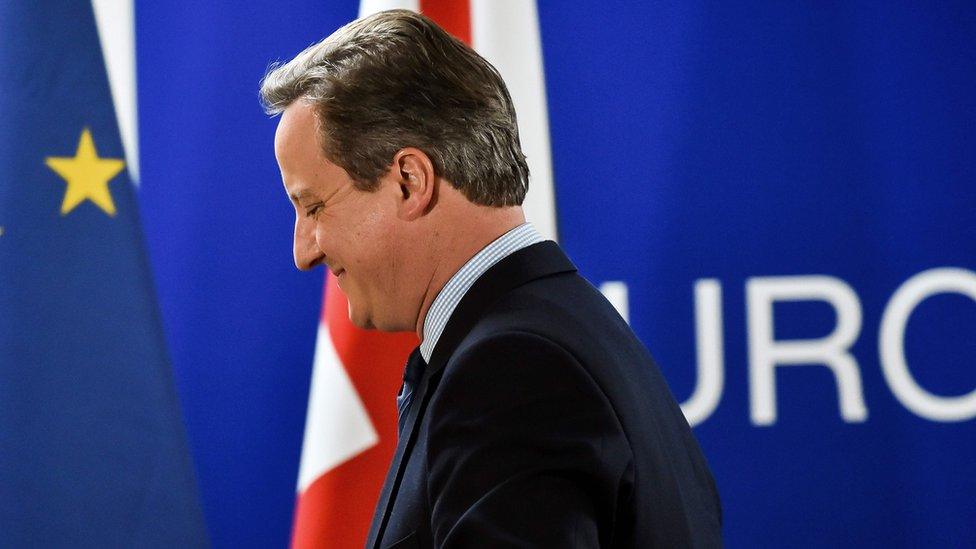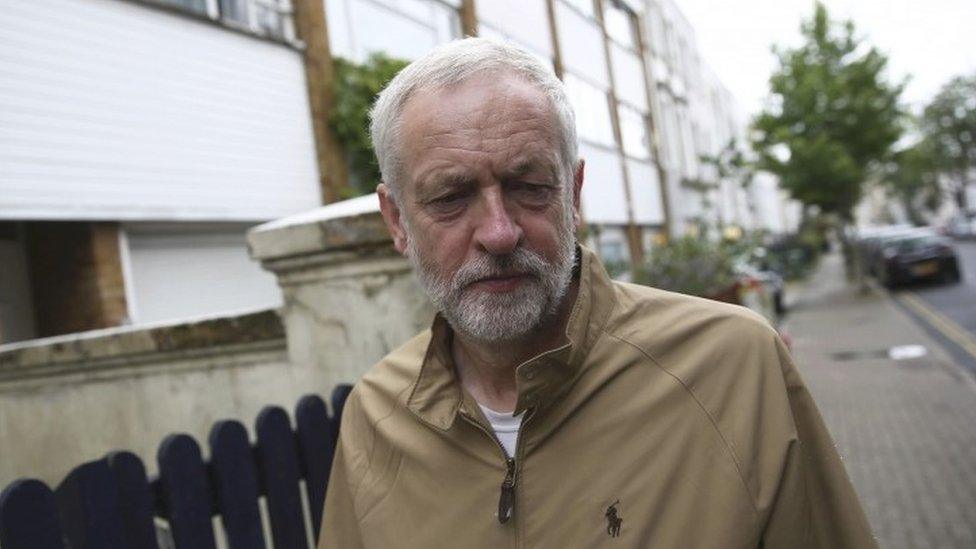Why Angela Merkel is biding her time over Brexit
- Published

Britain's vote to leave the EU presents Mrs Merkel with number of problems
A bit like an East German ringmaster in the eye of the hurricane that is the panic, noise and rumour in Europe surrounding Britain's Brexit vote, Angela Merkel has roared for silence.
Schweigen is a German word describing the specific quiet you get when people do not speak.
And schweigen is what Mrs Merkel now hopes for from fellow EU leaders and her own cabinet members, to give some semblance of EU unity and calm.
At a closed gathering of Europe's centre-right parties in Brussels last week for example, she appealed to, or rather instructed, politicians to hold their counsel on Brexit until after the summer.
Crisis or no crisis, you can count on European politicians to unfailingly take their cherished August holiday.
This year, Mrs Merkel hopes it will serve as a cooling-off period for the resentful, fizzing with outrage at "ungrateful UK" (like Spain); the vengeful, itching to make life miserable for a post-Brexit Britain (like France); the panicked, worrying about the imminent demise of the rest of the EU (such as Italy); and the media divas/politicians without real influence (such as the president of the European Parliament or the foreign ministers of various countries including Germany) who hog the headlines, making unhelpful waves.
But, canny politician that she is, Angela Merkel cannot imagine that after a splash or two in the Mediterranean, Europe will be much more coherent in its attitude towards Brexit.

More on Brexit:

She knows it will not be.
But the August time-out gives her space to plan.
September will tell her which UK prime minister she will have to deal with in Brexit negotiations, for example.
And it is policy, attitude and experience that will likely temper her attitude rather than the sex of the UK's next premier, as has been suggested by some (male) commentators.
The summer break will also give Mrs Merkel time to try to get her own house in order.
Next year is election year in Germany and parties are already in campaign mode.
Angela Merkel heads the centre-right CDU party. Both the Social Democrat vice-chancellor and her sister conservative CSU party in Bavaria have already tried to use the Brexit vote to damage her.

French President Francois Hollande is likely to want to make life difficult for post-Brexit UK
The Social Democrats blame Mrs Merkel's austerity programme for souring public opinion against the EU.
The CSU insists Germany must not pay a euro more to plug the gaping hole that will be left in the EU budget by Britain's departure.
Domestic pressure
But what is bothering Angela Merkel most of all are recent public opinion polls..
German voters are traditionally seen as some of the EU's most enthusiastic supporters but according to news channel N24, 62% of Germans now want decision-making powers transferred from Brussels back to Berlin.
Mrs Merkel, who grew up in the communist East, under the shadow of Germany's World War Two history, is a passionate supporter of European unity.
But ever the pragmatist, she is keenly aware the people of Europe demand change.
For now she seems happy to allow the man sometimes referred to as her "attack dog" - remember the Greek euro crisis a year ago? - to make EU reformist noises.
Finance Minister Wolfgang Schaeuble gave a round of interviews this Sunday, saying time was of the essence and demanding that EU capitals take back powers from the European Commission so as to be more effective in times of crisis.

By the end of the summer Mrs Merkel will know who replaces UK PM David Cameron
In fact, rather quietly, Angela Merkel and fellow EU leaders had already whipped the carpet from under the Commission's feet last week, hastily appointing their own chief negotiator for Brexit talks.
The Commission had assumed it alone would play the starring European role in the drama.
And this is just the beginning.
A high-level EU source of mine predicts almighty clashes ahead with the European Commission post-Brexit on the back of the lessons Europe's leaders are gleaning from the vote.
"They [the European Commission] are the real fat cats, the out-of-touch bureaucrats Leave campaigners in the UK complained about, but they are not the EU," he told me.
"We, leaders and willing European parliamentarians, now have to wrest back EU control from the civil servants."
One final reason Angela Merkel hopes for voices in Europe to be silent over the summer is to allow the chaotic proportions of Britain's post-referendum political and economic firework display to make their full impact across the European side of the Channel.
She hopes it will serve as a warning to the continent's multitude of Eurosceptics to call for EU change by all means but to beware of EU departure for fear that THAT could happen to THEM too.
- Published27 June 2016
- Published24 June 2016
- Published19 June 2016

- Published4 July 2016
